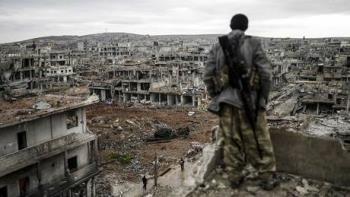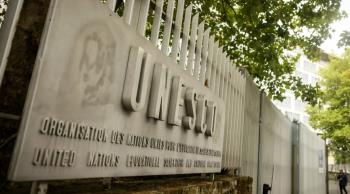Alwaght- Yemeni peace talks in Switzerland were halted on Friday after the country's Ansarullah Movement suspended all meetings with the faction of ousted President Mansour Hadi protest over cease-fire violations by Saudi-led aggressors.
During a news conference after meeting with UN envoy Ismail Sheikh on Friday, the chairman of Ansarullah delegation to the Yemeni talks in Switzerland said they presented a protest paper to the United Nations for ignoring the cease-fire.
Mohamed Abdel Salam confirmed that the movement will continue participation in the consultation sessions.
The protest paper dealt with the violations committed by the coalition aggression against many Yemeni areas which have ‘turned into a military offensive,’ through aerial bombardment that has also extended to Al-Jawf and Marib.
He said that the Yemeni national delegation protest came as the United Nations “hasn’t been able till now to install the cease-fire that has been agreed upon before we came to Muscat.”
Two days ago, the Yemeni army spokesman said the Saudi-led coalition states are violating the UN-sponsored ceasefire, warning that the Yemenis will not simply stand and watch.
"Dangerous escalation is taking place through land, sea and air by the aggressors," Brigadier General Sharaf Luqman told Sabaa news agency late on Tuesday.
The Yemeni army and the popular committees are completely committed to the ceasefire and the aggressors are taking advantage of this, the army spokesman said.
The Saudi warplanes did not stop to stage air raids since the ceasefire came into effect on Tuesday noon, Luqman said.
However, he warned that the Yemeni army and the popular committees will not keep mum in face of such escalation and will strongly respond to the coalition violations.
Over 7,600 have been killed during the Saudi-led airstrikes which began late March Yemen with over 16,000 injured. Most of the casualties are civilians especially women, children and the elderly.
The illegal war has inflicted damages on hundreds of important installations in the civilian infrastructure including hospitals, schools, mosques, residential quarters, water reservoirs etc.
- Trump Announces US Withdrawal from UNESCO Due to Palestine Admission
- Iranian IRGC Frigate Joins Joint Naval Drill with Russia in Caspian Sea
- Yemeni Forces Strike Ben Gurion Airport Using ‘Palestine 2’ Hypersonic Missile
- Iran to Maintain Uranium Enrichment, Says Foreign Minister
- UNRWA Chief: Hunger and Exhaustion Causing UN Staff and Doctors to Collapse in Gaza
- E3 Has No Legal Grounds to Trigger Snapback, Says Iran’s Deputy FM
- Iran Leader’s Advisor Moscow Visit Sends Security Messages to West amid Regional Escalation
- Tehran-Beijing Rail Connection: How’s Iran Become China’s Big Partner?
- For The First Time in Over a Decade, US Nuclear Weapons Have Been Deployed to England
- Putin Received a Significant Message from Iran
Editor's Choice

Resistance or Destruction: Syria Developments Have Serious Lessons to Iraq and Lebanon Syria is sinking in chaos as it forsook its historical resistance identity and this sends warnings to Iraq and Lebanon.
As Syria Sinks in Crisis again, Re-embracing Spirit of Resistance Looks Only Working Choice Syria faces a serious danger of split under al-Jolani’s rule and the only option for survival is return to its past path.
Israel Deadlock in Yemen: Why’s Sana’a Unbeatable? Tel Aviv is facing a serious challenge as Ansarullah of Yemen continues to enhance its military capabilities.
New Roadmap for Lebanon Betrays Next American-Israeli Moves The US sets a deadline for the Lebanese government to disarm Hezbollah, or Israel will keep occupying parts of southern Lebanon.
Netanyahu Striving to Drag US into War The Israeli regime is escalating its aggression against Iran to pave the way for American involvement in war.
News

Trump Announces US Withdrawal from UNESCO Due to Palestine Admission
The US has decided to exit UNESCO once again due to the body’s decision to include Palestine as a memberIranian IRGC Frigate Joins Joint Naval Drill with Russia in Caspian Sea A frigate from Iran’s IRGC joined a combined maritime rescue and relief drill conducted by Iranian and Russian navies in the Caspian Sea
Yemeni Forces Strike Ben Gurion Airport Using ‘Palestine 2’ Hypersonic Missile In solidarity with Palestinians facing severe aggression in Gaza, the Yemeni Armed Forces fired a hypersonic ballistic missile at Israel’s main airport
Iran to Maintain Uranium Enrichment, Says Foreign Minister Iranian FM Abbas Araghchi declared that the country’s uranium enrichment program, which he lauded as a local triumph, is non-negotiable
UNRWA Chief: Hunger and Exhaustion Causing UN Staff and Doctors to Collapse in Gaza According to UNRWA chief Philippe Lazzarini, hunger is causing agency personnel, doctors, and humanitarian workers in Gaza to collapse
E3 Has No Legal Grounds to Trigger Snapback, Says Iran’s Deputy FM Tehran has reiterated its warning that the European signatories to the JCPOA have no legal right to trigger the snapback mechanism
For The First Time in Over a Decade, US Nuclear Weapons Have Been Deployed to England US nuclear weapons have reportedly returned to British soil for the first time since at least 2008
Putin Received a Significant Message from Iran Russian President Vladimir Putin received a significant message from Iran during a meeting with an advisor to the Leader of the Islamic Revolution
Iran to Press Demands in E3 Talks, Blames Europe for Nuclear Deal Breakdown Foreign Ministry spokesman Esmaeil Baghaei stated that Iran will assert its demands in upcoming talks with the E3
Two Additional Agents with Alleged Ties to Mossad Arrested in Northeastern Iran Iranian security forces have apprehended two operatives linked to the Israeli Mossad spy agency in North Khorasan Province
Israeli Warplanes Carry Out Multiple Airstrikes on Yemen’s Hudaydah Port On Monday, Israeli warplanes launched a series of airstrikes targeting Yemen’s Hudaydah port on the Red Sea
Iran and EU3 Reach Agreement to Restart Negotiations Iran and the European troika comprising the UK, France, and Germany have agreed to resume nuclear talks
Iran, Russia to Launch Joint Naval Drill in Caspian Sea Iranian and Russian naval forces will conduct a joint exercise in the Caspian Sea next week
West Bank Protests Slam Israeli Atrocities and Famine Tactics in Gaza Mass protests erupted across the West Bank as thousands of Palestinians demanded an end to Israel’s genocide in Gaza
Iran Urges European Nations Not to Justify Israeli and US Aggression Abbas Araghchi expressed concern over efforts by certain European nations to rationalize the Israeli regime’s and the United States’ recent aggression against Iran
Iran Restores Air Defenses Damaged in Israeli Attack The Iranian Army’s Deputy for Operations stated that the country has successfully replaced the air defense systems damaged during the recent Israeli aggression
FM Araghchi: Iran ‘Completely Prepared’ Should Israel Break ‘Fragile’ Ceasefire According to Foreign Minister Abbas Araghchi, Iran is on high alert and ready to protect itself if the Israeli regime breaks the “fragile” ceasefire
Pentagon Mimics Iranian Kamikaze Drone Technology The United States has replicated and introduced its own variant of the Iranian Shahed-136 loitering munition
Russia Dismisses Latest EU Sanctions, Says It Has Grown Immune Following the EU’s 18th round of sanctions aimed at Moscow’s oil industry, Russia stated it has developed a level of immunity
Israel and Syria Reach Ceasefire Agreement to End Hostilities US Ambassador to Turkey Tom Barrack confirmed that Israel and Syria have agreed to a ceasefire
Most Viewed
E3 Has No Legal Grounds to Trigger Snapback, Says Iran’s Deputy FM
UNRWA Chief: Hunger and Exhaustion Causing UN Staff and Doctors to Collapse in Gaza
Iranian IRGC Frigate Joins Joint Naval Drill with Russia in Caspian Sea
Iran Leader’s Advisor Moscow Visit Sends Security Messages to West amid Regional Escalation
Iran to Maintain Uranium Enrichment, Says Foreign Minister
Yemeni Forces Strike Ben Gurion Airport Using ‘Palestine 2’ Hypersonic Missile
Trump Announces US Withdrawal from UNESCO Due to Palestine Admission
From Ethiopia to Indonesia as Destinations: Has the Grand Migration of Gazans Started?
Iran, Russia to Launch Joint Naval Drill in Caspian Sea
Israel Strikes Military Headquarters in Damascus
Trump Cautions Zelensky Against Targeting Moscow
Ayatollah Khamenei Claims Israel Turned to US in Pursuit of Iran Ceasefire
Israeli Air Defense Chief Reassigned After Iranian Missile Attacks
Iran Commends China for Denouncing Israeli and US Military Actions
What’s behind Moves to Destabilize Yemen’s Al Mahra?
West Bank Protests Slam Israeli Atrocities and Famine Tactics in Gaza
Pentagon Mimics Iranian Kamikaze Drone Technology
Iran Restores Air Defenses Damaged in Israeli Attack
Russia Dismisses Latest EU Sanctions, Says It Has Grown Immune
For The First Time in Over a Decade, US Nuclear Weapons Have Been Deployed to England
Two Additional Agents with Alleged Ties to Mossad Arrested in Northeastern Iran
Iranian Commander Commends Air Defenses for Thwarting US-Israeli Attacks
Syria-Israel Normalization Pending between Al-Sharaa’s Willingness and Netanyahu’s Worry
New Roadmap for Lebanon Betrays Next American-Israeli Moves
Changing Air Power Balance: Will Iran Buy Chinese Fighter Jets?
Israel and Multi-layer Losses in War with Iran
Why’s Trump Insisting on Gaza Ceasefire Plan?
Iraq, the Strategic Middle Ground During Israeli-Iranian War
Is Trump lying about Fordow Nuclear Site Attack?
Israel’s Costs of War on Iran
Ayatollah Khamenei Presides Over the Ashura Night Mourning Ceremony in Tehran
Israeli Soldiers Returning from Gaza War Increasingly Commit Suicide
Senior Iranian General Says Armed Forces Fully Confronted Threats
Iran’s "Operation Annunciation of Victory": Why’s Trump Announced Ceasefire?
Following Israeli Aggression, Yemen’s Ansarullah Promises to Deprive Zionists of Rest
Qatar Hosts Renewed Indirect Ceasefire Negotiations Between Israel and Hamas
According to Source, Israel Seeks War as Iran Stands Fully Ready
In Focus

Ansarullah
A Zaidi Shiite movement operating in Yemen. It seeks to establish a democratic government in Yemen.
Shiite
represents the second largest denomination of Islam. Shiites believe Ali (peace be upon him) to be prophet"s successor in the Caliphate.
Resistance
Axis of Resistances refers to countries and movements with common political goal, i.e., resisting against Zionist regime, America and other western powers. Iran, Syria, Hezbollah in Lebanon, and Hamas in Palestine are considered as the Axis of Resistance.
Persian Gulf Cooperation Council
A regional political u n i o n consisting of Arab states of the Persian Gulf, except for Iraq.
Taliban
Taliban is a Sunni fundamentalist movement in Afghanistan. It was founded by Mohammed Omar in 1994.
Wahhabism & Extremism
Wahhabism is an extremist pseudo-Sunni movement, which labels non-Wahhabi Muslims as apostates thus paving the way for their bloodshed.
Kurds
Kurds are an ethnic group in the Middle East, mostly inhabiting a region, which spans adjacent parts of Iran, Iraq, Syria, and Turkey. They are an Iranian people and speak the Kurdish languages, which form a subgroup of the Northwestern Iranian branch of Iranian languages.
NATO
The North Atlantic Treaty Organization is an intergovernmental military alliance based on the North Atlantic Treaty which was signed on 4 April 1949.
Islamic Awakening
Refers to a revival of the Islam throughout the world, that began in 1979 by Iranian Revolution that established an Islamic republic.
Al-Qaeda
A militant Sunni organization founded by Osama bin Laden at some point between 1988 and 1989
New node













